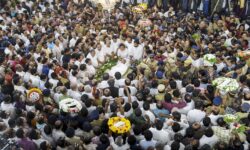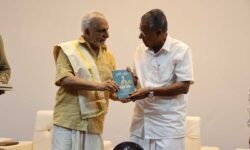KOCHI:
Close to 17 years after the Gujarat riots, independent filmmaker Revati Laul has come out with a book that documents how certain perpetrators of the crime have gone on to reform themselves. At the Kochi-Muziris Biennale, she read out tales that instilled hope in humanity even after the worst of crimes the world saw in modern times.
Lines from the ‘Anatomy of Hate’ echoed at the art festival’s Pavilion in Cabral Yard this weekend, as the author of the recently-released book read out dark tales that followed after the Godhra torching of the Sabarmati Express carrying Ayodhya pilgrims in early 2002. And, often turning focus to the silver linings too.
There is a need to write about them today, said Delhi-based Laul, also a senior journalist. “This book is not to show just the heinousness of human crimes. I primarily wanted to know where extreme violence comes from,” she added.
The 232-page non-fiction published by Context/Westland profiles the stories of three men and their role in inciting mobs across Gujarat, where they went on a rampage after 59 passengers in the Ahmedabad-bound train from the holy city of Varanasi were burnt to death on February 27, 2002. Some of them go on to recount the tales with a changed vision: remorseful about their inhuman act.
Laul, who was NDTV’s correspondent from Gujarat during the riots, said the book sought to explore the reason why the lynch mob of 2002 found massive support. It revisits the details of the murders through the lens of three key perpetrators: Suresh ‘Langdo’ Jadeja, Pranav (name changed) and Dungar.
The writer, who has been covering politics for over 20 years, notes how Pranav has reformed himself after reveling in the mob frenzy of Gujarat 2002. It was at a social workshop, much later, that Laul ran into Pranav. “I was covering the event where historian Ram Puniyani was discussing polarisation and violence,” she added. “I remember turning my camera to the first person sitting in front of me. I asked him, ‘What do you think about all of this?’. He said, ‘My way of thinking has changed entirely’.”
That was a response Laul least expected, she added.
The journalist subsequently learnt that this interviewee was pursuing his master’s in social sciences when the Godhra riots broke out. He joined hostel-mates, ransacked shops and looted them. It took Laul 10 years to convince Pranav to come forward and share his story. “In his story, we see that the same person later gets a job with an NGO that is into rehabilitating the Muslims who suffered in the riots,” the author says. “For me, that that is the pivot of the book. It’s important to know what happened to the perpetrators after a riot of such large scale.”
The book also delves into the psyche of a person who married a woman from the minority community out of hate to seek revenge from it.




